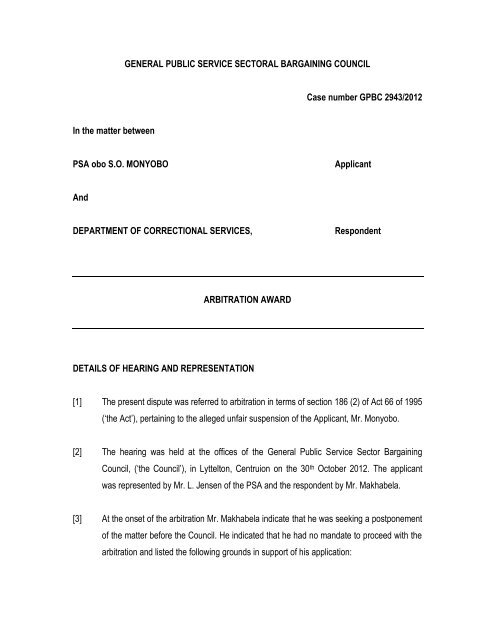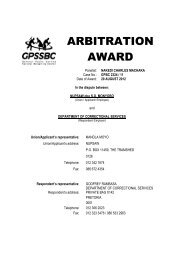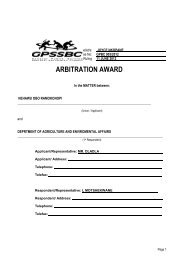Case # GPBC 2943/2012 - GPSSBC
Case # GPBC 2943/2012 - GPSSBC
Case # GPBC 2943/2012 - GPSSBC
You also want an ePaper? Increase the reach of your titles
YUMPU automatically turns print PDFs into web optimized ePapers that Google loves.
1. He intended calling 3 witnesses, one of which was currently on studyleave;2. He was not properly briefed in the matter.3. He was not trying to drag the matter out unnecessarily but theRespondent needed further time to prepare its case and its witnesses.[4] The application was opposed. The Applicant indicated that the Respondent could haveapplied for a proper postponement in terms of the Council’s rules if it had needed moretime to prepare. The Applicant would be prejudiced as his suspension was deemed to beunfair and both parties attended the conciliation proceedings as such the Respondent waswell aware of what the matter pertained to.[5] The application for postponement was refused on the basis that the Respondent had notmade out a proper case for postponement. Not being prepared, where the notice of thearbitration was served on the party in accordance with the Council’s rules, can never begood enough cause to postpone any matter. The Respondent was however afforded anindulgence to secure its witnesses and to provide proof that the Respondent’s one witnesswas in fact writing exams. Prior to the time stipulated by myself the Respondent returnedand informed me that it was not able to secure its witnesses nor to get the written proofrequested by myself. The Respondent’s representative also requested to be excused. Hewas warned of the implications of such a decision but in the end decided not to partake inthe arbitration proceedings.ISSUES IN DISPUTE[6] I must determine if the Respondent’s committed an unfair labour practice when itsuspended the Applicant, and whether such suspension amounts to an unfair suspensionas provided for under Section 186(2) of the Labour Relations Act. .SURVEY OF EVIDENCE AND ARGUMENT
on suspension. He testified that he believed that he was not given a proper opportunity tomake presentations regarding any of his suspensions.[14] Mr. Manyobo testified that the Respondent’s policies provided for the specific instance inwhich one could be suspended. He referred to the Respondent’s disciplinary code andprocedures Item 7.2 which regulates precautionary suspension where it stipulated underwhich circumstances an individual should be suspended and further that a disciplinaryhearing must be conducted within a period of a moth or 60 days. He also confirmed that athis disciplinary hearing in January <strong>2012</strong> no decision was made with regard to any furtherpostponements as such he believed that his suspension was a contravention of theRespondent’s policies.[15] In argument, the applicant submitted that the respondent had acted unfairly in suspendinghim as there were no grounds for his suspension, the Respondent had not followed its ownpolicies and he believed that even the suspension letters he had received were in fact notissued in accordance with the proper delegation of authority provisions. The Applicantasked that the suspension to be uplifted as he felt that he was currently prejudiced by thesuspension, both in his professional and in his personal live. He was also evicted from thehouse the Respondent had initially rented for him and was now staying in a much smallerapartment.The case for the respondent[16] As the Respondent had decided, contrary to being advised of the risks for the Respondent,not to partake in the arbitration proceedings, there is no evidence that was presentedbefore me regarding the current matter.
ANALYSIS OF EVIDENCE AND ARGUMENTLegal consideration / policies[17] A. In accordance with the disciplinary code and procedures for the public service section,precautionary suspension should be considered if7.2 (a)(i) the employee is alleged to have committed a serious offence; and(ii) the employer believes that the presence of an employee at theworkplace might jeopardize any investigation into the allegedmisconduct, or endanger the well being or safety of any person orstate property”B. Furthermore in the employee relations circular 1 of 21 pertaining to suspension <strong>2012</strong>/13the Department of Correctional services (DCS) issued the following national regulation(Page 22 to 24, of bundle A), regarding precautionary suspension of employees:“5. Paragraph 4.4 of the attached suspension policy for the Department ofCorrectional Services provides that an employee any be suspended forduty if he or she has committed a serious misconduct.5.1 ..examples of serious misconduct…5.2 An employee may only be suspended if his presence in the work situationis undesirable for one or more of the following reasons:…7. Managers should also consider alternatives to suspension ….”C. The suspension policy for the DCS, dated the 23 rd of February 2001 requires theemployer to afford the employee the opportunity to make written representation as to whyhe should not be suspended (Page 27, of bundle A) and further that a disciplinary hearingshould be commenced with within (7) days for the date of the suspension.
[18] From the content of these documents it is evident that the Respondent had tried, within itsown policies, to minimize the lost of person-days as a result of suspension and to ensurespeedy resolution of disputes.[19] The Respondent was offered an opportunity to attend the arbitration proceedings and at itsown peril decided not to do so. As such I have only the Applicant’s evidence to consider.[20] The Applicant’s uncontested evidence is that he was suspended, again suspended andonce more suspended. Although the first two suspensions pertained to the same incidentsthe result of these suspensions was that the Applicant had not been working, except for 1short day, for a total period of 19 months. Although it is trite that any employer has the rightto suspend as a form of caution, it must do so within a framework of fairness and at leastwithin its own policies.[20] .Item 4 of Schedule 8 of the Labour Relations Act, requires an employer to conduct aninvestigation prior to taking disciplinary action against an employee and also confirms theemployers right to suspend pending the enquiry. However section 186(2)(b) of the Act indirect contrast to this states that a suspension of an employee can be unfair, and as suchprovides therefore that it could be classified as a form of unfair labour practice.[21] The general principle is not to suspend unless there are prima facie grounds to believe thatthe employee has committed a serious form of misconduct. This view is also in line withthe Respondent’s policies in this regard. It is further trite that there must be an objectivelyjustifiable reason for the suspension. In the matter of Mogothle v Premier of the NorthWest Provinces & another [2009] 4 BLLR 331 (LC) the Labour Court noted thatsuspension of an employee pending an inquiry into alleged misconduct is equivalent to anarrest. It further found that the suspension should therefore be used only when there is areasonable apprehension that the employee will interfere with investigations or pose someother threats.
[22] The Applicant’s uncontested evidence is that the report into the allegations of his housingsituationwas already completed in March 2011 and the report was submitted to him inJune 2011. Although the report was not presented during the arbitration hearing thisversion was not contested.[23] Furthermore even if the Applicant’s last suspension was regarding his “extendedoccupation of rented accommodation” there is no evidence before me to suggest that thisfalls in a category of serious misconduct and that there was a need for the Respondent toremove the Applicant from his workstation to complete their further investigation as alludedto on page 33 of bundle A, or to prevent the Applicant for committing further similar acts ofmisconduct if he is not suspended.[24] The question of unfair suspension was also considered in SA Post Office Ltd v Jansen vanVuuren NO & other (2008) 29 ILJ 2793 (LC). The CCMA Commissioner dealing with thematter at the CCMA found that Jansen van Vuuren’s suspension constituted an unfairlabour practice on the ground that the employee was unaware of the nature of the offencehe was alleged to have committed and was not given an opportunity to makerepresentation concerning his suspension. He also found that the suspension prejudicedthe employee, psychologically, socially and in terms of his job prospects. The Labour Courtupheld this decision.[25] The Applicant’s evidence is further that a disciplinary hearing was scheduled for January<strong>2012</strong>. At that sitting the chairperson recused himself and subsequently he was informed byhis legal representative that the initiator had indicated that he was going to amend thecharges. To date he has not been given another date nor a new charge sheet and as suchhe was left in the dark as to what he was exactly charged for and when progress will bemade in this regard. The Applicant’s evidence was further that he was not given a properopportunity to make any representations regarding his suspension and it would appear asif he therefore finds himself in a similar position to that which van Vuuren found himself inthe matter referred to above.
[26] Furthermore an employer cannot just suspend an employee sit back and do nothing. FromJanuary to the date of the arbitration some 9 months later no positive action was taken bythe Respondent in this matter to bring finality to the current dispute. They had ambleopportunity to conduct and conclude a proper disciplinary enquiry in this time frame.[27] In considering these facts together with the Respondent’s policies, which talks about 30 or60 days, I find that it is reasonable to conclude that the suspension of the Applicant iscurrently used as a form of punishment and in no manner can longer be regarded as beinga form of justifiable precautionary suspension. It is evident that the suspension ispreventing the Applicant from exercising his right to work and the prolonged nature of theresent suspension it clearly has an adverse effect on the Applicant. I therefore concludedthat the conduct of the Respondent towards the Applicant amounts to an unfair labourpractice, under Section 186(2) of the Act in that the Applicant’s suspension is found to beunfair.Remedy[28] In terms of section 193(4) of the Act I have the authority to determine this dispute on termswhich I deem to be reasonable.I have considered whether to instruct the respondent to finalize the disciplinaryproceedings against Mr. Monyobo but have decided that it would be simpler and moreappropriate in this instance simply to order the upliftment or setting side of the suspensionso that Mr. Monyobo can return to his work on the same ‘terms, conditions, privileges andbenefits of the employee that were suspended when the suspension was put into effect’.CostsThere has been no argument before me regarding any consideration in terms of costs.
AWARD1. The respondent is found to have committed an unfair labour practice with regard tothe suspension of the applicant employee, Mr. M.O. Monyobo, in terms of section186(2)(b) of Act 66 of 1995, as amended.2. The respondent is hereby ordered to set aside the suspension of Mr. M.O. Monyoboby no later than 19 th November <strong>2012</strong> and to permit Mr. Monyobo to return to his postas Director.3. There is no order in respect of costs.Marleze Blignaut (Swanepoel)Arbitrator31 October <strong>2012</strong>















